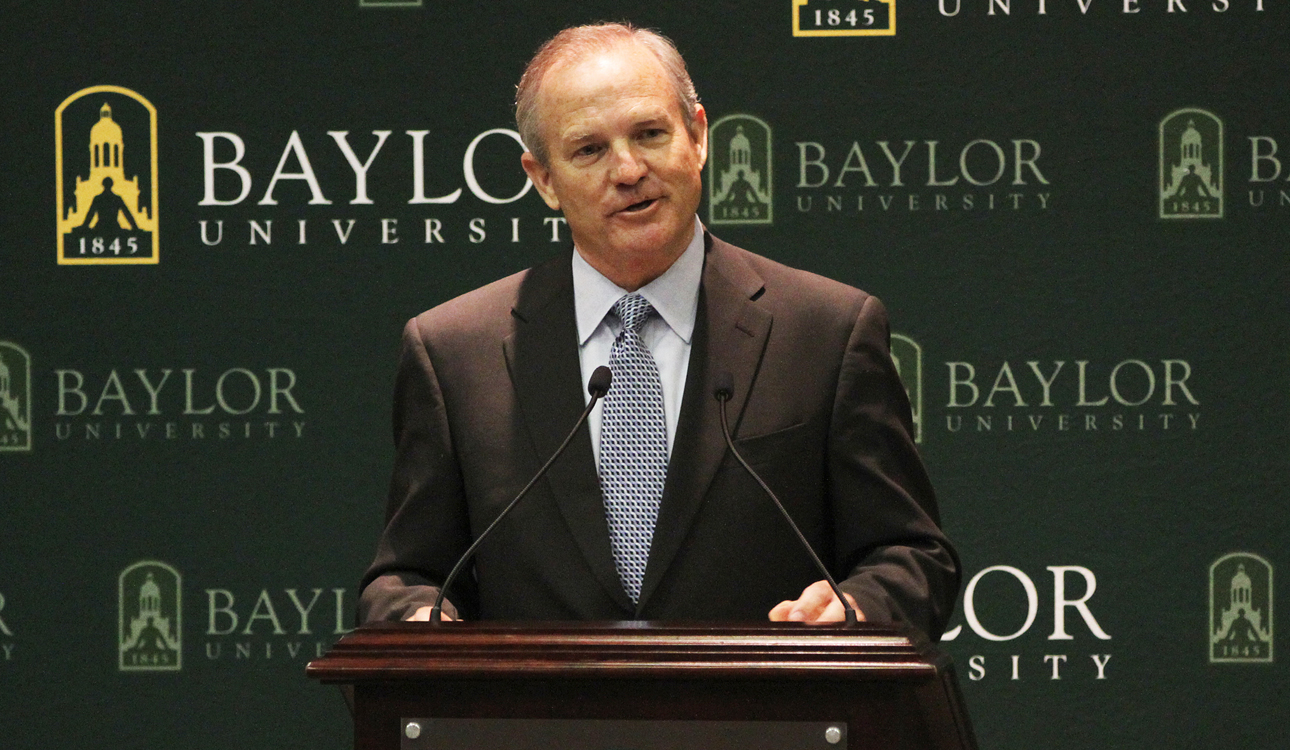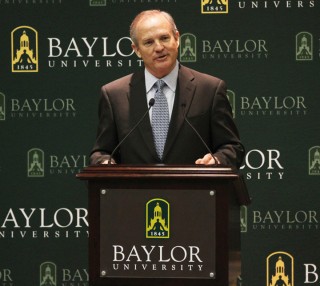

Matt Hellman | Lariat Photo Editor
By Kayla Reeves
Reporter
There are problems in Washington, but America’s positive aspects can overcome them, Former Congressman Chet Edwards said at the W. R. Poage Legislative Library’s Spring Lecture Tuesday. The lecture was titled, “What’s Wrong with Washington and Right about America?”
Edwards, the W.R. Poage distinguished chair for public service, was introduced by his father-in-law, Dr. John Wood, Baylor graduate and founder of Mission Waco.
“Whatever you could write out as far as characteristics of the ideal person, ideal politician, ideal lawmaker, ideal husband, father and son-in-law, all of it would apply to Chet Edwards,” Wood said.
The first problem Edwards mentioned in his lecture was partisanship. There are huge divisions in America among political parties, religions and cultures, he said, and so many politicians refuse to work with together to find common ground.
News today is also much more divided than it used to be, Edwards said.
“People are listening to the news that tells them what they want to hear,” he said. “So what happens is the American people, I find, are getting more locked into their positions and less willing to see across party lines.”
The news also frequently tries to sum up political affairs in eight-second sound bites, which cannot give the full story, he said.
Many people get news from biased and unfiltered emails, blogs and websites, Edwards said. Even his father-in-law, Wood, has been tricked by chain emails about the government, Edwards said, like one that claimed President Barack Obama was going to do away with the American flag and national anthem.
Edwards said other things that add to partisanship include congressional redistricting, which allows politicians to switch communities with another district instead of trying to work with their citizens; lower voting at primaries, which means most of the voters are very far right or left; party leadership in the House and Senate; and the invention of the jet airplanes that allow congressmen to live far away from Washington and therefore not have to socialize with each other as often.
The second big problem in Washington after partisanship is that neither political party is being honest with Americans about the tough choices it will take to reduce the national debt, Edwards said.
If we divide the total debt by the number of citizens in America, it will come out to $45,000 for every man, woman and child, he said, adding that until politicians can work together and be honest about the economy, that will not get better.
The last major issue Edwards mentioned is the influence of “big money.” Campaigning costs millions of dollars, he said, and some groups have fundraising minimums.
“Members of Congress are having to spend so much time dialing for dollars that they don’t have enough time to deal with issues,” he said, “and the more special interest groups are giving these big dollars, the more they are demanding complete loyalty for their views.”
Basically, if a group agrees to finance a campaign, they will expect the politician to always vote according to the group’s ideas, though that is not how politicians should operate, Edwards said.
Edwards then talked about the good things about America, starting with the Constitution as the “bedrock foundation of our democracy.”
He mentioned the system of checks and balances, separation of powers and majority rule as “inspired brilliance” of our Constitution.
However, the real greatness of America is the strength of values and faith of our citizens, he said. Then Edwards shared stories about people he remembers as brave and honorable Americans.
A little girl who had a rare form of cancer came to D.C. with her mother to lobby for more investment in the National Institutes of Health and drugs for rare diseases. She died at age 12, but Edwards said he will never forget her, and to him, she is an example of what is what is right about America.
Another story was about Marine Gunnery Sgt. John David Fry, who had a wife and three young children, serving in Iraq. He signed up for the most dangerous job possible, diffusing bombs, Edwards said. He got his hand mangled by an explosion, but refused to stop serving his country.
Then when we was finally being sent home, he volunteered to diffuse one more bomb, but did not know it was booby-trapped. Another bomb exploded and killed him.
“From our everyday heroes, we can see what is right with America,” Edwards said. “There is a lot wrong with Washington, but I truly, deeply believe that what is right will overcome what is wrong with Washington.” The lecture was concluded with a question and answer session and a reception.
Dr. Andy Hogue, lecturer of political science, agreed with Edwards about the need to address problems in Washington. The Constitution is not broken, he said, and deliberative democracy is meant to be messy.
“As it rids itself of reasonable moderates and agents of compromise like Congressman Edwards, Washington will get worse before it gets better,” Hogue said, “and it will only get better if we acknowledge that it has gone astray, if we educate ourselves about its shortcomings and if we deliberate carefully about how to fix them.”





